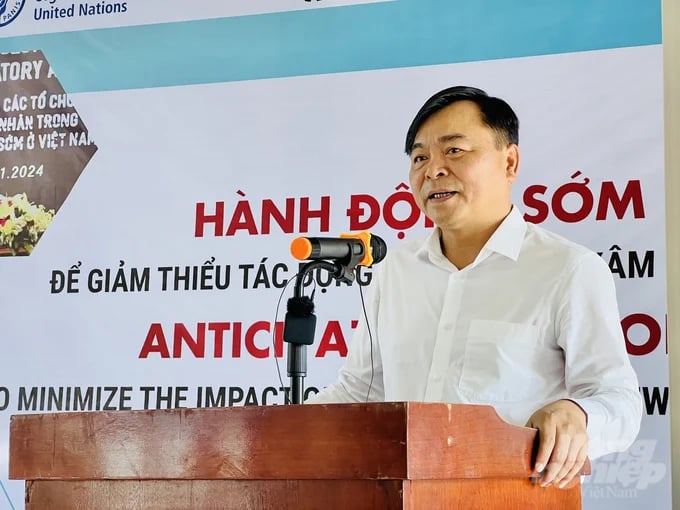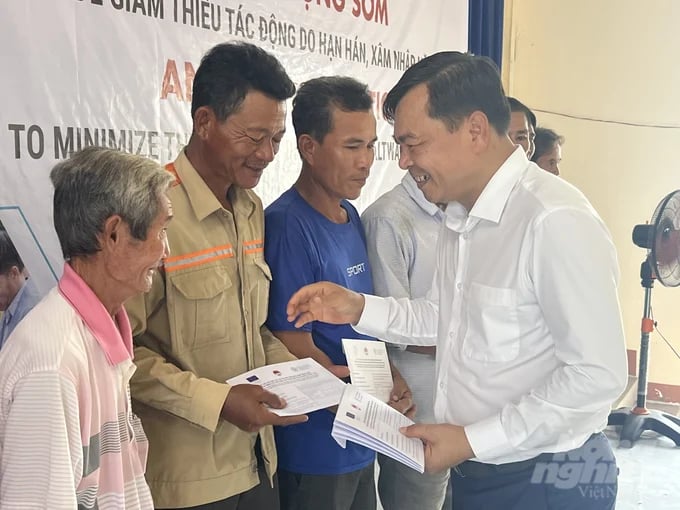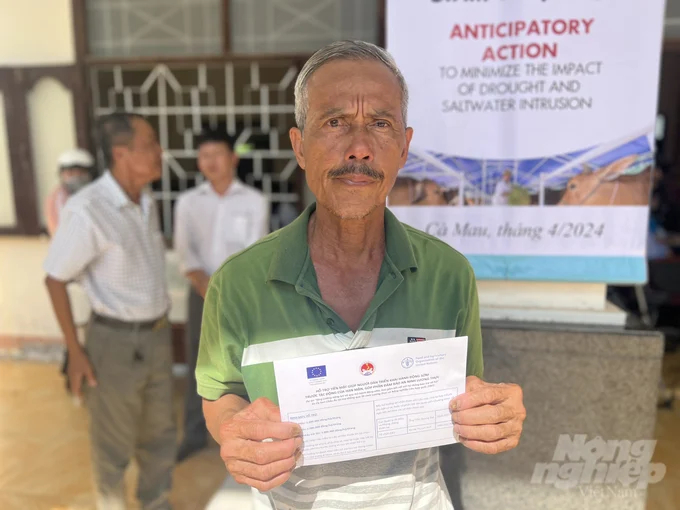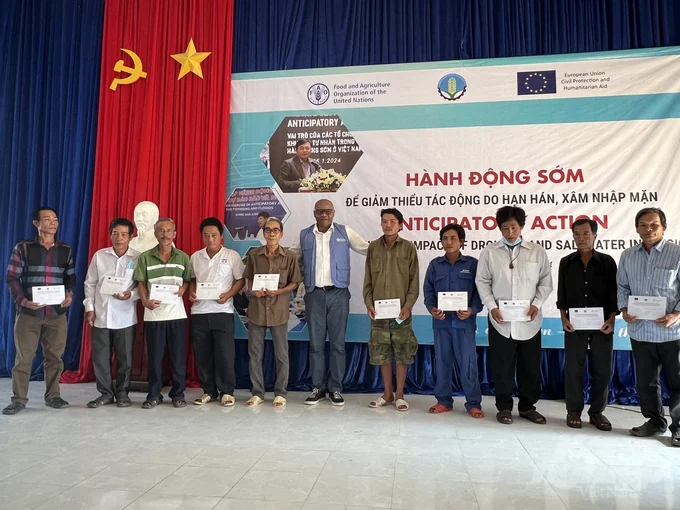May 30, 2025 | 07:10 GMT +7
May 30, 2025 | 07:10 GMT +7
Hotline: 0913.378.918
May 30, 2025 | 07:10 GMT +7
Hotline: 0913.378.918

Deputy Minister of Agriculture and Rural Development, Nguyen Hoang Hiep, and the FAO delegation in Vietnam visited and distributed cash to individuals affected by drought and saltwater intrusion in Ca Mau province. Photo: Trong Linh.
On April 9, in Khanh An commune, U Minh district (Ca Mau), Deputy Minister of Agriculture and Rural Development, Nguyen Hoang Hiep, and a delegation from the Food and Agriculture Organization (FAO) in Vietnam visited and distributed cash to individuals affected by drought and saltwater intrusion in Ca Mau province.
The program to visit and distribute cash to individuals affected by drought and saltwater intrusion falls within the framework of the project "Strengthening Capacity and Expanding the Scope of Early Action Implementation along with Connecting to the Social Protection System," led by the Department of Dyke Management and Natural Disaster Prevention and Control (MARD) in collaboration with FAO. This initiative is also part of the series of events during the "National Clean Water and Environmental Sanitation Week 2024."
The cash distribution activities for individuals are divided into two phases (April and May 2024), with a total cost exceeding 5.4 billion VND. The benefit limit for a household with one person is 1 million VND; for a two-person household, it is 2 million VND; and for households with three or more individuals, it is 3 million VND per installment.

Deputy Minister of Agriculture and Rural Development, Nguyen Hoang Hiep, distributing cash to households in U Minh district, Ca Mau province. Photo: Trong Linh.
Deputy Minister of Agriculture and Rural Development, Nguyen Hoang Hiep, mentioned that due to the impact of El Nino, since the beginning of 2024, the lack of rainfall, drought, and saltwater intrusion have affected numerous socio-economic sectors and people's lives. The lives of people in the Mekong Delta region, especially in Ca Mau province, have been significantly affected, with challenges such as road subsidence and disrupted livelihoods.
Currently, there are still around 50,000 rural households (approximately 3.6% of households) affected by water shortages, with Ca Mau province alone having about 4,000 affected households.
The Prime Minister also issued Directive No. 11 dated April 1, emphasizing the reinforcement of measures to prevent and combat heat, drought, water shortage, and saltwater intrusion.

The recipients of support packages from FAO express their joy. Photo: Trong Linh.
According to Deputy Minister Nguyen Hoang Hiep, following an assessment of the situation in Ca Mau province, the MARD, in collaboration with FAO Vietnam, decided to initiate early action to support disadvantaged households in four communes (Khanh An, Khanh Thuan - U Minh district; Khanh Hung - Tran Van Thoi district; Bien Bach - Thoi Binh district). Over 1,000 households will receive cash support in two installments (in April and May), with each household of three or more members receiving 6 million VND in support.
"While this amount may not be substantial, I hope it will provide some relief to people during this challenging period caused by natural disasters like drought and saltwater intrusion," shared Deputy Minister Nguyen Hoang Hiep.
The Deputy Minister urged localities to continue prioritizing water sources for both domestic and agricultural use in the immediate future. He stressed the need to accelerate the completion of centralized clean water supply projects in rural areas, provide support for household water supply solutions, and educate households on water conservation practices and the use of water storage devices.
In the long term, there is a necessity to develop comprehensive planning that prioritizes water resources as a central aspect of other planning efforts. This includes clearly identifying sources of water for daily life to ensure safety, sustainability, and resilience against natural disasters, along with devising plans to ensure domestic water supply for the years ahead.

Mr. Rémi Nono Womdim, FAO Representative in Vietnam, handing money to households. Photo: Trong Linh.
Mr. Rémi Nono Womdim, FAO Representative in Vietnam, remarked, "This is the first activity in Vietnam activating early action to respond to drought, demonstrating the landmark commitment of the Government of Vietnam and FAO to advance the agenda and pioneer the application of this approach in Southeast Asia. Vietnam's pioneering application of this approach is truly commendable. Working together to minimize the impact of drought in Ca Mau is an important step forward and an inspiring example for other countries not only in the region but globally, and we hope this will boost commitments to this approach in Vietnam's future."
According to the representative of the Department of Dyke Management and Natural Disaster Prevention and Control, since 2022, the Department has closely collaborated with FAO in Vietnam to implement the technical support project "Strengthening Capacity and Scale of Implementing Early Action with Connection to the Social Protection System."
This project is regional, involving five countries, including Vietnam. The component of the project in Vietnam has an estimated total budget of about 1.7 million USD from non-repayable ODA funds provided by the European Agency for Humanitarian Aid and Civil Protection Operations (DG ECHO) through FAO.
In Vietnam, FAO coordinates with the Department of Dyke Management and Natural Disaster Prevention and Control, as well as the Steering Committees for Natural Disaster Prevention and Control at all levels and provinces, to develop Early Action Plans and promote their integration into the natural disaster prevention system in Vietnam.
Translated by Quynh Chi

(VAN) Ms. Nguyen Thi Dung, Deputy Director of Ngoc Hoang Cooperative, shared about the journey of bringing dragon fruit to Europe, achieving annual revenues in the billions of VND.

(VAN) Bamboo products from Thang Tho Bamboo Cooperative have reached many countries around the world, while also creating jobs for local workers.

(VAN) The Management Board of Con Dao National Park reported that a green sea turtle, tagged in the Philippines, has traveled thousands of kilometers to lay 84 eggs on Bay Canh Islet.

(VAN) Green technology is paving a new path for sustainable aquaculture in the Mekong Delta in particular and across the country in general, helping reduce emissions and adapt to climate change.

(VAN) On May 27, La French Tech Vietnam (the French startup and innovation community in Vietnam) held the French Tech Summit Vietnam 2025.
/2025/05/27/4731-2-223159_980.jpg)
(VAN) No votive paper, no styrofoam, no plastic bags, no plastic bottles, and no single-use plastic trays are the key rules tourists should keep in mind when visiting Con Dao.

(VAN) In the fight against plastic pollution, Vietnam has been demonstrating a proactive, pioneering, and active role in addressing the greatest environmental challenge today.